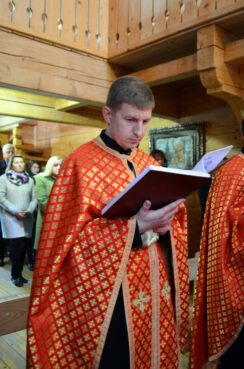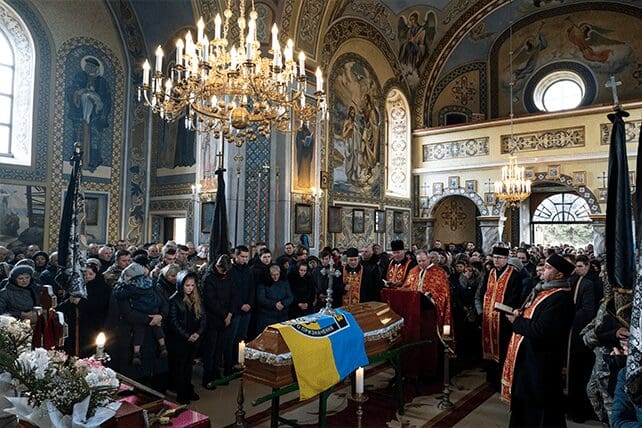(RNS) — The war in Ukraine has raged on for nearly five months, and the Rev. Oleksiy Zavada, a Greek Catholic priest in Lviv, has had hardly a moment’s rest.
Zavada is quick to point out the city of Lviv has been spared the brunt of violence that’s ripped through many other parts of the country, especially in the east. But still, life in western Ukraine carries constant reminders of the realities of war on the front lines.
“Many, many, many soldiers in our armies are from the western part of Ukraine,” Zavada, the notary of the Curia at the Greek Catholic Archeparchy of Lviv, told Religion News Service on Saturday (July 9).
The Greek Catholic tradition is a long-standing, historic strand of Catholicism in Ukraine, whose name comes from the resemblance of its worship services, priestly vestments and use of icons to those of the Greek or Byzantine rites found throughout Orthodox churches worldwide. Similarly, Greek Catholic priests are permitted to marry and have children. However, the Greek Catholic Church is and has long been under the authority of the pope.
Zavada, a priest of 13 years, also ministers as assistant priest at the Parish of the Ascension of our Lord in the northeast part of the city. He spoke over the phone about the many funerals he’s presided over, how the life of the church has changed — and stayed the same — since the war started, and why he plans to stay, no matter how tired he is.
The following conversation has been edited for length and clarity.
We see many priests serving together in images of funerals from Ukraine. Has this always been common in Ukraine, or did it begin during the war?

The Rev. Oleksiy Zavada in Lviv, Ukraine. Courtesy photo
Normally in Ukraine when a person dies, one priest is present for the funeral service. But when a person dies that played an important role in society, it’s normal that many priests come for the funeral. Even priests from different denominations come. As you know, the religious situation in Ukraine is that we have a couple of Orthodox Churches, we have the Roman Catholic Church, we have the Ukrainian Greek Catholic Church, which I belong to.
This tradition, to gather many priests together at a funeral, seems to me to come from (the pro-European protests) in Maidan, in 2014, when many heroes that we call nebesna sotnya (the heavenly hundred) were killed.
The war with Russia began in 2014. Not 2022. It seems to me that from that period in 2014, it became a tradition for people to meet the body of a fallen soldier: They go out on the street and they bow down on their knees and they make a live chain.
It’s a pity that we have such a tradition, but there it is.
So these funeral practices both among clergy and laypeople are not new —they date from earlier national events — the Maidan uprising, Revolution of Dignity, and Russia’s invasion of Crimea and the Donbas in 2014?
Yes, yes. But of course, now, since Feb. 24 (2022), we have many, many more deaths of our soldiers. So this practice is almost everywhere and ongoing.
We have many, many funerals in Lviv. We have one church (Sts. Peter and Paul Garrison Church) — it’s a chaplaincy church for soldiers. In this church there are funerals of fallen soldiers very often.
We have videos, photos, these sorts of social networks. So in this way, we can hear sermons during the funerals. You feel that you participate in these funerals, even if you are not present in the building.
Of course some soldiers who are killed, we know (personally). For example, one priest I know, his son was killed a couple of weeks ago: Father Mykhaylo Dymyd, his son, Artem Dymyd, was killed.
You say there are often clergy from many different Christian traditions at funerals. Are there Ukrainian priests from the Moscow Patriarchate who attend these funerals?
I don’t know of any such cases — that priests from the Moscow Patriarchate come for funerals. You know, the position of people, of our faithful, of Ukrainians in relation to the Ukrainian Orthodox Church – Moscow Patriarchate, is quite, quite negative. In different regions of Ukraine, the local regional administrations have made decisions to forbid these parishes (under the Moscow Patriarchate) in their regions.

